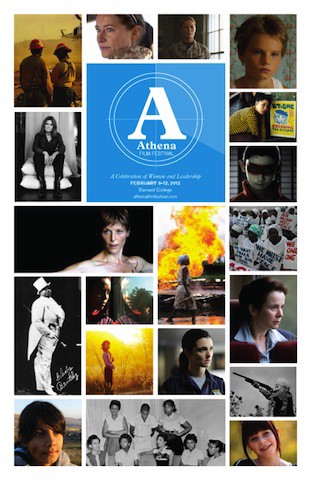A couple of years ago as part of my work on Women and Hollywood I hosted a party for the great Australian director Jane Campion. Campion is one of only four women nominated for a best director Oscar — in 1993 for her film “The Piano.” (Only one, Kathryn Bigelow, has won.) At the party many of the female filmmakers talked about how hard it was to make films about strong female characters. Fortuitously, also at that event was Kathryn Kolbert who had just launched the Athena Center for Leadership Studies at Barnard College. We spoke, we conspired, and the Athena Film Festival was born.
If we had realized at the time when we were planning how much work it would take to create a film festival, we both probably would have given up. But I’m glad we didn’t, and the success of our first year in 2011 proved that we were on to something: We showed 25 films (features, docs and shorts), honored 13 women, and had 2,500 people attend over the weekend.
From what I’ve discovered, women’s film festivals are struggling. When many of them were created, women filmmakers couldn’t get their work into the more mainstream festivals. Now, women’s work is everywhere and women filmmakers don’t want to be pigeon-holed as “women” directors, especially if the festival has a feminist bent.
But the reality is that it is still much more difficult for women to become successful in the film business. That’s not just anecdotal. Look at the numbers — both in front of and behind the scenes. In 2011, women made up just five percent of the directors on the top grossing films of the year, and that lowly number is actually a two-point decrease from the previous year. Women also make up only 30 percent of roles in front of the camera. It’s not that women are not going to the movies. Women buy 50 percent of all tickets according to the last data available by Motion Picture Association of America (MPAA).
The Athena Film Festival is unique in the world of women’s film festivals in that we are focused on women’s leadership. By spotlighting the content of the films rather than on the gender of the director we distinguish ourselves. That doesn’t mean we don’t try and get as many women directed films as we can. But our mission is to create a cultural conversation about how vital it is for all of us — and for our future — to have more female leaders at all levels in our society. And you can use movies, awards, and events to propel this conversation. Using movies makes sense. We live in a visual society where movies and TV shows are a large part of how we relate and communicate with each other.
But let’s be honest. Because there are far fewer films about women and far fewer women directors, it can be quite a challenge to program this type of festival. So in order to find the films that make up the program that will roll out this week, we used a variety of different avenues to come up with the films. We scoured film festival programs from across the globe; we had a submission process; we used a list of films from Women and Hollywood; and of course we asked colleagues for recommendations.
The good news for us is the because we are not a competitive festival, we don’t need to focus on having premieres. As a result we can screen films that have been released over the last year that people may have missed. Films like “Circumstance,” “The Whistleblower,” “Oranges and Sunshine,” and “Tomboy” all played in theaters this past year. But when they are pulled together in a program with documentaries — some of which have had minimal screenings like “Who Took the Bomp,” “The Rescuers,” and “Apache 8” — you look at those films in a different context. It might not have made sense for the women’s leadership aspect to have been marketed at release, but now those aspects of a film can be highlighted. Several of the films aired on TV: “Gloria in Her Own Words,” “The Education of Dee Dee Ricks,” and “Off the Rez” as well as the first two episodes of Danish series “Borgen,” which shows us a fictional story of the first female prime minister in Denmark.
One of the most fun areas to program and one that doesn’t get enough attention is the shorts program. It is important because shorts are a great place for a young director to get her or his feet wet, but I also love the shorts program because you can see an animated film about a young girl out for vengeance in the same program as a revisiting of the Harriet Tubman story and a piece about queer blues divas in the 1920s. The shorts are the festival’s hidden treasures.
Come to Barnard this weekend where you can see a program of films that individually might not have gotten your attention, but when put together show the depth of women’s leadership and the possibilities for our future.






